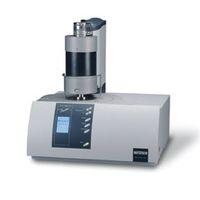Netzsch - STA 449 F3 Jupiter®
Manufactured by Netzsch
Fascinating Flexibility in Thermal Analysis
The new simultaneous thermal analyzer NETZSCH STA 449 F3 Jupiter® allows the measurement of mass changes and thermal effects between -150°C and 2400°C.
The high flexibility caused by the various sensors, the great variety of sample crucibles and the wide TGA-measuring range make the system applicable for analysis of all kinds of materials including also inhomogenous substances.
Easily interchangeable sample holders allow the optimal system adaption to the diverse application areas (TGA-, TGA-DTA- and TGA-DSC-measurements).
Various furnaces, easy interchangeable by the user, cover the complete temperature range.
Through to the vacuum tight design measurements at defined atmospheres (e.g. inert) are possible.
The system is controlled by a newly developed integrated digital electronic device.
The analysis of measuring data runs under a standard PC and the well-proven MS®-WindowsTM software.
The high flexibility caused by the various sensors, the great variety of sample crucibles and the wide TGA-measuring range make the system applicable for analysis of all kinds of materials including also inhomogenous substances.
Easily interchangeable sample holders allow the optimal system adaption to the diverse application areas (TGA-, TGA-DTA- and TGA-DSC-measurements).
Various furnaces, easy interchangeable by the user, cover the complete temperature range.
Through to the vacuum tight design measurements at defined atmospheres (e.g. inert) are possible.
The system is controlled by a newly developed integrated digital electronic device.
The analysis of measuring data runs under a standard PC and the well-proven MS®-WindowsTM software.
Active Questions & AnswersAsk a Question
1Replies
pasword
1Replies
Sample tc is broken
Need Equipment Support?
Documents & ManualsView All Documents
Features of STA 449 F3 Jupiter®
DSC features:
- Determination of onset, peak, inflection and end temperatures
- Automatic peak search
- Transformation enthalpies: -Analysis of peak areas (enthalpies) with selectable baseline and partial peak area analysis -Enthalpy determination allowing for mass changes -Complex peak analysis with all characteristic temperatures, area, peak height and half-width
- Comprehensive analysis of glass transitions
- Automatic baseline correction
- Degree of crystallinity
- O.I.T. (oxidative induction time) evaluation
- Specific heat determination (optional)
- BeFlat® for automatic DSC baseline correction (optional)
- tau-R Mode: takes into account the time constant and thermal resistance of the instrument and reveals thus sharper DSC effects from the sample (optional available for the use with DSC sample carrier)
- DSC correction: evaluation of exo- and endothermal effects under consideration of system time constants and thermal resistance values (optional)
TGA features:
- Mass changes in wt% or mg
- Automatic evaluation of mass-change steps
- Determination of residual mass
- Extrapolated onset and end temperatures
- Peak temperatures of the 1st and 2nd derivative of the mass-change curve
- Automatic baseline/- and buoyancy-correction
- c-DTA® for calculated DTA signal with evaluation of characteristic temperatures and the peak area (optional for TGA measurements)
General Specifications
There are no General Specifications available.

